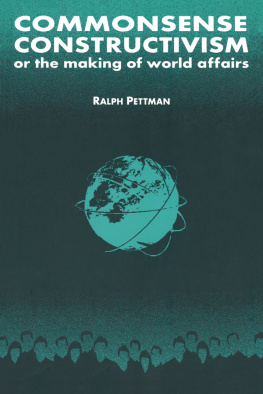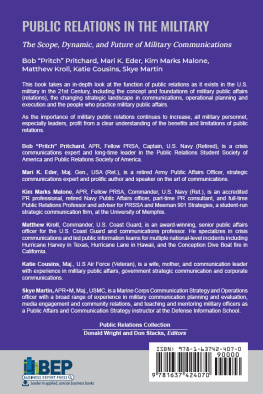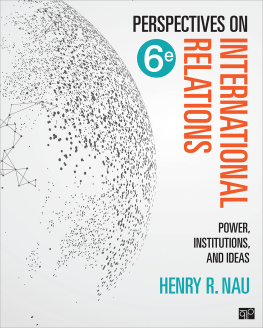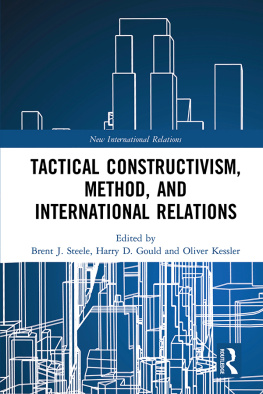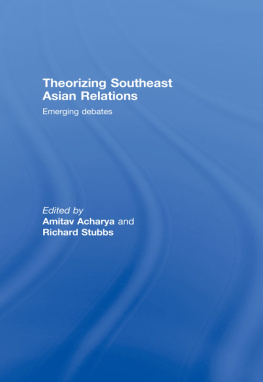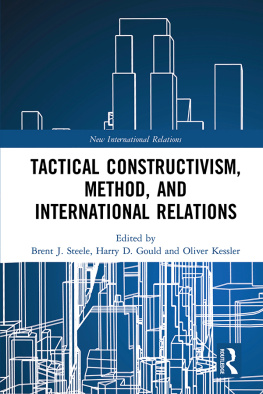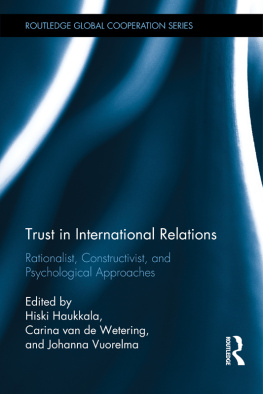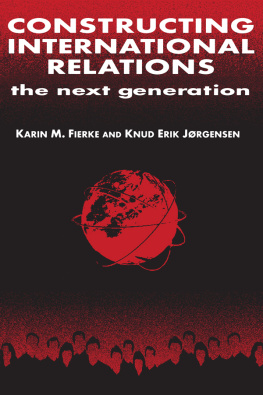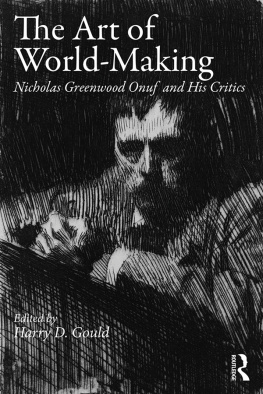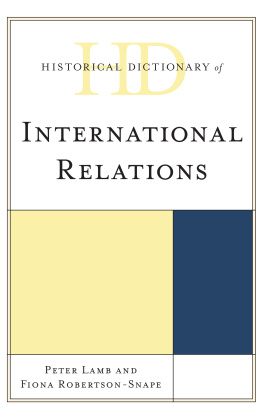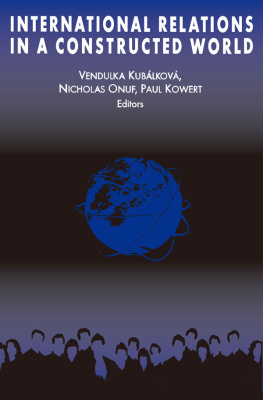COMMONSENSE
CONSTRUCTIVISM
International Relations in a Constructed World
Series Editors
Vendulka Kublkov, University of Miami
Nicholas Onuf, Florida International University
Ralph Pettman, Victoria University of Wellington
Editorial Advisory Board
Emanuel Adler, Hebrew University of Jerusalem
David Blaney, Macalester College
Kurt Burch, University of Delaware
Stuart Corbridge, University of Miami
Franois Debrix, Florida International University
Gavan Duffy, Syracuse University
Karin Fierke, Queens University of Belfast
Rodney Hall, University of Iowa
Ted Hopf, Ohio State University
Paul Kowert, Florida International University
Lily Ling, Institute of Social Studies, The Hague
Cecelia Lynch, University of California, Irvine
Elisabeth Prgl, Florida International University
Wayne Sandholtz, University of California, Irvine
Jutta Weldes, Bristol University
COMMONSENSE
CONSTRUCTIVISM
or the making of world affairs
RALPH PETTMAN
First published 2000 by M.E. Sharpe
Published 2015 by Routledge
2 Park Square, Milton Park, Abingdon, Oxon OX14 4RN
711 Third Avenue, New York, NY 10017, USA
Routledge is an imprint of the Taylor & Francis Group, an informa business
Copyright 2000 Taylor & Francis. All rights reserved.
No part of this book may be reprinted or reproduced or utilised in any form or by any electronic, mechanical, or other means, now known or hereafter invented, including photocopying and recording, or in any information storage or retrieval system, without permission in writing from the publishers.
Notices
No responsibility is assumed by the publisher for any injury and/or damage to persons or property as a matter of products liability, negligence or otherwise, or from any use of operation of any methods, products, instructions or ideas contained in the material herein.
Practitioners and researchers must always rely on their own experience and knowledge in evaluating and using any information, methods, compounds, or experiments described herein. In using such information or methods they should be mindful of their own safety and the safety of others, including parties for whom they have a professional responsibility.
Product or corporate names may be trademarks or registered trademarks, and are used only for identification and explanation without intent to infringe.
Library of Congress Cataloging-in-Publication Data
Pettman, Ralph.
Commonsense constructivism, or, The making of world affairs / by Ralph Pettman.
p. cm. (International relations in a constructed world)
Includes bibliographical references and index.
ISBN 0-7656-0577-5 (cloth: alk. paper) ISBN 0-7656-0578-3 (paper: alk. paper)
1. International relations. 2. Constructivism (Philosophy) I. Title: Commonsense
constructivism. II. Title: Making of world affairs. III. Title. IV. Series
JZ 1308.P48 2000
327.101dc21 | 99-087793 |
ISBN 13: 9780765605788 (ebk)
ISBN 13: 9780765605771 (hbk)
Contents
This book has been thirty years in the making and Im grateful indeed to all those who helped. They are many by nowfar too many to name here. That said, I would like to thank three people in particular.
For the last few years Jim Rolfe has been my closest critic. As I inched toward the obvious, it was he who did most to keep me honest. It was a task he performed with all the aplomb of the professional soldier he once was. Thanks, Jim.
Vendulka Kublkov pointed out my proclivity for commonsense constructivism. It is her term and it could not be more apt. She also helped me to recast the manuscript so that my radical affinity with the Miami Group might be made more apparent. Thanks, VK.
Nick Onuf went through it one last time with a fine-toothed comb. We still disagree, but not by much. Thanks, Nick.
COMMONSENSE
CONSTRUCTIVISM
In the Beginning
I first encountered International Relations (IR) as an undergraduate student in Adelaide, South Australia. The course I took then discussed contemporary states, the national interest, the balance of power, causes of wars, alliance structures, and the United Nations. It did so in an historically discursive way, and our textbook was Hans Morgenthaus analysis of power and political realism, Politics Among Nations.
International Relations in Australia at that time was very much a hand-me-down version of what was taught in the imperial mother country, Britain. Morgenthaus American textbook marked a transition, therefore. What had been a discipline with a strong British accent (and literally so, since our lecturer was from the London School of Economics and Political Science) was beginning to lose its characteristic cadence. International Relations at that time was becoming more American, and the choice of text symbolized that change. Thus, while we were given the works of British analysts to admire, and in particular E.H. Carrs The Twenty Years Crisis, the text was Politics Among Nations, and the approved approach was U.S.-style realpolitik.
The Behavioralist Turn
Following a well-trodden path, I went to Britain and did my postgraduate work at the above-mentioned London School of Economics and Political Science (LSE). There I was introduced to an even more notable American approach, namely, behavioralism. The Americans had emerged from World War II top dogs of the democratic world. They had emerged to face a well-organized ideological antagonist, however, and American state-makers felt the need to foster the study of world affairs as a consequence. A confrontation of the Cold War kind required a discipline with the power to explain and predict. The power to control world affairs presupposes such a capacity, and the most reliable knowledgethe kind that best allows of prediction and controlis scientific knowledge. It is no accident therefore that the American discipline of world affairs became at this time a self-consciously scientizing one.
I learned at the LSE that scientizing meant giving human rationality primary cultural status and that this was a European cause that dated from the seventeenth century or thereabouts, and arguably from the ancient Greeks. Eminent Europeans have promoted it globally ever since, though they have had to contend with copious evidence of human irrationality in the process, much ofthat on their own continent.
I also learned that, by the eighteenth and nineteenth centuries, rationalism had come into its own as a way of getting not only to God or wealth or honor, but to ends defined in rationalistic terms alone. In its broadest sense, rationalism means the commitment to reason, the willingness to follow the use of the reasoning mind wherever it might lead (Cottingham 1984). Having made this mind-move in general, however, one can double or square it, as it were, and use reason in ways specifically designed to provide reliable knowledge. The social sciences were one outcome of this doubling process, with thinkers like Auguste Comte expressing the hope that the study of society could be made to match the study of nature in scientific terms. Comte saw the natural and social realms as being fundamentally the same. He saw the power of reason as capable of describing and explaining social realities as natural ones, not only in general terms, but in particular terms as well. He sought as a consequence to apply scientific methods to the study of human societyconceptualize! hypothesize! test! He sought, as he saw it, a positivist approach that could be applied to human beings and nature alike (Comte 1875).

